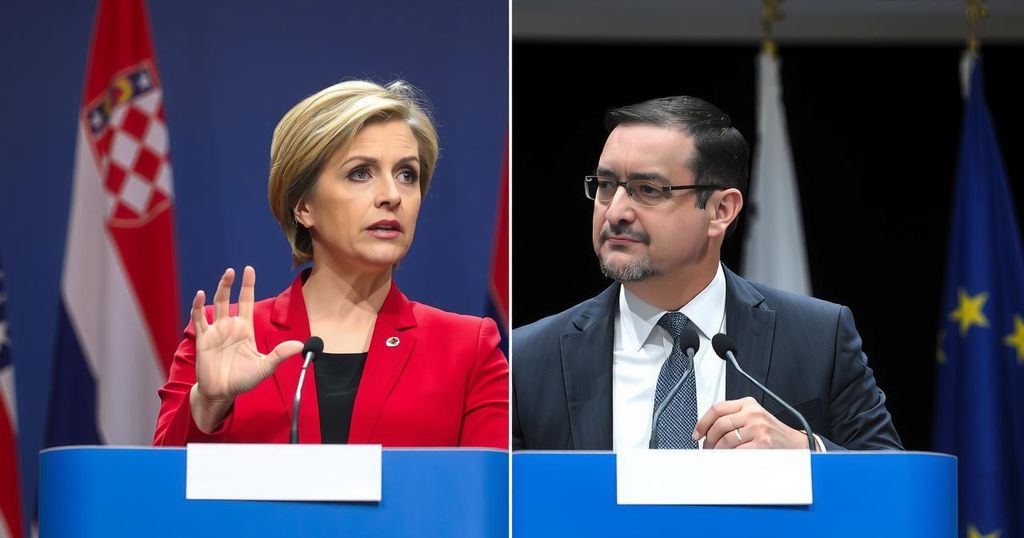Croatia’s President Set for Election Run-Off Against Conservative Rival

Croatia’s President Zoran Milanovic will compete against conservative Dragan Primorac in a run-off election after Milanovic secured 49.11 percent of the vote in the first round. Primorac garnered 19.37 percent, with significant implications for the dominant HDZ party amid ongoing economic challenges. This election is perceived as part of the prolonged conflict between Croatia’s President and Prime Minister, highlighting critical societal issues.
Croatia’s incumbent President Zoran Milanovic is set to confront conservative challenger Dragan Primorac in an election run-off following his narrow failure to achieve an outright victory in the initial voting round. Official results indicated that Milanovic, aligned with the opposition left-wing Social Democrats, earned 49.11 percent of the votes, while Primorac, representing the ruling conservative HDZ party, garnered 19.37 percent. With concerns mounting regarding inflation, corruption, and labor shortages, the run-off presents a significant challenge for Prime Minister Andrej Plenkovic and his party.
Milanovic’s near-majority in the first round raises questions about the influence and future of the HDZ, which has governed Croatia since its independence in 1991. The office of the president, while limited in powers, is considered crucial in maintaining political balance. Milanovic, a prominent figure in Croatian politics for nearly two decades, previously served as prime minister and has been noted for his sharp rhetoric. He has critiqued both his domestic opponents and international allies, periodically invoking populist tactics to galvanize support.
Dragan Primorac, a physician with a historic background in politics, has embarked on a campaign focused on unity and patriotic values, positioning himself as a unifying figure contrasting with Milanovic’s confrontational style. Political analysts suggest that the upcoming run-off will significantly be defined by the ongoing rivalry between these two influential leaders, reflecting deeper political tensions in the country.
The election results reveal widespread voter apprehension regarding persistent issues in Croatian society, including governance challenges and economic instability. As the campaign evolves, the candidates will need to address these pressing concerns while campaigning for incremental votes. Ultimately, the political landscape in Croatia remains uncertain, hinging on the outcomes of this forthcoming clash between two distinct political ideologies and the future direction of the country’s governance.
The upcoming presidential election runoff in Croatia marks a critical juncture amid ongoing concerns regarding economic challenges and governance issues. Croatia, an EU and NATO member, has faced significant difficulties, including high inflation, widespread corruption, and a labor shortage. The president has a role in commanding the armed forces and influencing foreign policy, thus the office holds importance despite its limited formal powers. The political landscape has been largely dominated by the HDZ party since Croatia’s independence in 1991, and the candidacy of incumbent President Milanovic represents a challenge to their long-standing rule.
In conclusion, the impending electoral contest between Zoran Milanovic and Dragan Primorac represents more than just a political rivalry; it is indicative of broader socio-economic concerns within Croatia. As the public grapples with pressing issues, the candidates must effectively address these challenges to galvanize support in the forthcoming runoff, which will determine the political balance of power and possibly the future direction of the nation.
Original Source: www.dailygazette.com








